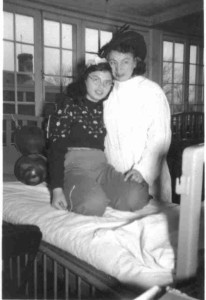The Auerbacher family lived with relatives as Inge’s parents struggled to find work and to learn English. Inge attended school for the last two months of the school year and had a difficult time adjusting to the language and culture. It was a very lonely time for her, since she had difficulty communicating with the other children and was unfamiliar with their games.

To make matters worse, Inge was suffering from a severe cough that would not subside and unusual fatigue. Her mother, knowing that Inge had tested positive for tuberculosis while in Terezin, brought her to a doctor. Inge was then examined by a lung specialist and immediately admitted to the children’s hospital, where she was placed in the tuberculosis ward. She remained in the hospital for nearly two years, and very rarely was allowed to go home for a short visit. In the hospital, Inge’s English language skills developed greatly and she and the other children were taught many different subjects from visiting teachers. Inge worked hard to improve her English and struggled with math, and in the hospital she discovered an intense love of science, which she would later pursue as a career. She hoped to become a medical doctor, though the worsening of her tuberculosis would force her to revise her plan.
This story of incredible survival has had many moments of shock and sadness, and even though this chapter of her story takes place after the war, the shock and sadness continue. How crushing that her grandmother suffered such a fate. It is no wonder they left for a new home, and then for a new country. And how sad that she fell ill and once again had to live away from home. But this time her family could visit – and the war was very much over.
Eager to see the next installment!
Thank you so much for your thoughtful comment and for following Inge’s story. As you point out, the shock and sadness continues after the war. I am truly in awe of Inge’s resilience and strength in the face of so many daunting obstacles.